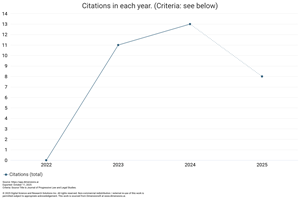Purpose of Implementing Progressive Law against Criminal Offenders in Order to Provide Legal Certainty and Legal Benefits
DOI:
https://doi.org/10.59653/jplls.v2i02.844Keywords:
Criminal Perpetrators, Implementation of Progressive Law, Legal Benefits, Legal CertaintyAbstract
The implementation of Progressive Law Enforcement is motivated by the desire to avoid negative effects on the ineffectiveness of the criminal justice system in accommodating criminal cases so that the law enforcement process does not continue through the courts. This writing uses descriptive legal research, in which the author uses a normative juridical research type using the Library Research data collection method. This research aims to find out the philosophical basis of Progressive Law in providing legal certainty and legal benefits and the application of Progressive Law by the National Police in increasing the resolution of criminal cases. Based on the research and discussion results, a picture is obtained that law is the rules and guidelines that regulate life in society to create peace and order. Progressive legal ideas occupy a separate legal position. Various groups in handling legal cases, especially in the country, emphasize the preposition of Progressive Legal theory. Especially emphasizing the element of benefit in the form of human peace in society, nation, and state, the implementation of progressive law as an effort to improve the resolution of criminal cases requires that police investigators be able to carry out their duties and authority professionally, accountably and morally so that progressive law enforcement can be in line with legal objectives. It provides legal certainty, legal benefits, and a sense of justice.
Downloads
References
Elviandri, E. (2019). Tawaran Dalam Penegakan Hukum Kebakaran Hutan Dari Hukum Progresif Menuju Paradigma Profetik.
Hartini, S. (2010). Kajian tentang kemandirian lembaga kepolisian dalam penegakan hukum pada era reformasi. Jurnal Civics: Media Kajian Kewarganegaraan, 7(1).
Hutajulu, J. H., Djatmika, P., & Navianto, I. (2014). Mediasi Penal Sebagai Alternatif Penyelesaian Perkara Pencurian Ringan (Studi Di Polres Malang Kota). Arena Hukum, 7(3), 388–403.
Jainah, Z. O. (2021). Budaya Hukum Penegak Hukum dalam Pemberantasan Tindak Pidana Narkotika-Rajawali Pers. PT. RajaGrafindo Persada.
Nawawi, A. B. (1984). Kebijakan Hukum Pidana (Penal Policy). Semarang: Universitas Diponegoro.
Nugroho, F. S. (2023). REKONSTRUKSI REGULASI PENEGAKAN HUKUM TINDAK PIDANA PENCURIAN DENGAN PEMBERATAN DI INDONESIA MELALUI PENDEKATAN RESTORATIVE JUSTICE. Universitas Islam Sultan Agung.
Nugroho, S. S., & SH, M. (2019). Sukma Hukum keadilan berhati nurani. uwais inspirasi indonesia.
Prasetyo, W. (2024). REKONSTRUKSI REGULASI PENGEMBALIAN KERUGIAN NEGARA PADA TINDAK PIDANA KORUPSI MELALUI KEBIJAKAN MEDIASI PENAL YANG BERBASIS KEADILAN PANCASILA. Universitas Islam Sultan Agung Semarang.
Putra, M. R. P. Y., & Rahayuningsih, T. (2023). Implications of Case Resolution Mechanism Due to Press Coverage through Non-Litigation Channels. Journal of Progressive Law and Legal Studies, 2(01), 213–223. https://doi.org/10.59653/jplls.v2i01.425
Putri, E. A. (2022). Penerapan Sanksi Pidana terhadap Pelaku Tindak Pidana Korupsi Ditinjau dari Perspektif Konsep Hukum Progresif (Application of Criminal Sanctions against Actors Corruption Crime from the Perspective.
Rahardjo, S. (2006). Membedah hukum progresif. Penerbit Buku Kompas.
Rahardjo, S. (2010). Penegakan hukum progresif. Penerbit Buku Kompas.
Rahmad, N., & Hafis, W. (2020). Hukum Progresif dan Relevansinya Pada Penalaran Hukum di Indonesia. El-Ahli: Jurnal Hukum Keluarga Islam, 1(2), 34–50.
Samodra, H. R. (2022). Rekonstruksi Diskresi Bhabinkamtibmas Sebagai Payung Hukum Dalam Implementasi Restorative Justice di Tingkat Penyidikan Berdasarkan Hukum Progresif. Universitas Islam Sultan Agung (Indonesia).
Sinaga, A. (2022). Konsekuensi Dan Perlindungan Hukum Terhadap Pemberi Sertipikat Jaminan Fidusia Dalam Perkara Pidana PT. Pilar Bahtera Mandiri Pada Pengadilan Negeri Jakarta Selatan. Universitas Kristen Indonesia.
Sujono, I., & Nugroho, M. (2023). Omnibus Law as Investment Law Reform in Indonesia Based on the Hierarchy of Legislation Principles. Journal of Progressive Law and Legal Studies, 1(02 SE-Articles), 47–65. https://doi.org/10.59653/jplls.v1i02.28
Sukadi, I. (2011). Matinya Hukum dalam Proses Penegakan Hukum di Indonesia. Risalah Hukum, 39–53.
Trisusilowaty, D., Lumbanraja, A. D., & Suteki, S. (2019). Fungsi Pengawasan Oleh Inspektorat Pengawasan Daerah Berbasis Pengaduan Masyarakat Dalam Perspektif Hukum Progresif. Law Reform, 15(1), 25–41.
Zaidan, M. A. (2022). Menuju pembaruan hukum pidana. Sinar Grafika.
Downloads
Published
How to Cite
Issue
Section
License
Copyright (c) 2024 Muhammad Rafandi Harahap, Andry Syafria Tanjung

This work is licensed under a Creative Commons Attribution-ShareAlike 4.0 International License.
Authors who publish with this journal agree to the following terms:
- Authors retain copyright and grant the journal right of first publication with the work simultaneously licensed under a Creative Commons Attribution-ShareAlike that allows others to share the work with an acknowledgement of the work's authorship and initial publication in this journal.
- Authors are able to enter into separate, additional contractual arrangements for the non-exclusive distribution of the journal's published version of the work (e.g., post it to an institutional repository or publish it in a book), with an acknowledgement of its initial publication in this journal.
- Authors are permitted and encouraged to post their work online (e.g., in institutional repositories or on their website) prior to and during the submission process, as it can lead to productive exchanges, as well as earlier and greater citation of published work (See The Effect of Open Access).
























